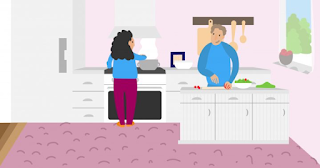I recently moved
in with my male partner and instantly started to notice a growing distress
around food within myself. As someone who has grown up on diets and later spent
a large sum of time dedicated to researching the relationships women have with
food and their bodies, I know the importance that food can take on in a woman’s
life. For many women, the idea of cooking, in particular, is inherently tied to
the traditional stereotypes of women’s household roles in the home: cooking,
cleaning, and taking care of one’s husband and kids. This image can be
confining for many, especially those who don’t conform to heteronormative or
binary gender roles and can have negative effects on one’s mental health.
Moreover, emphasis on traditional divisions of male and female roles
(masculinity/femininity) may account for health disparities in stress and
well-being that disproportionately afflict women (Mayor, 2015). While I enjoy
cooking, I found myself feeling that pressure when moving in with my male
partner to make sure I cooked for both of us. However, this added stress that
I did not predict as cooking started to feel more like an obligation than a
free expression.
We cannot deny
that that cooking is a domestic task women are socialized to perform. At the
same time, many women enjoy cooking. However, these things don’t really align.
As Julia Black, a writer for Bon Appetit, put it: “I Thought Cooking Would Make
Me a Bad Feminist.” So, how can women reclaim cooking for themselves without
feeling that they’re succumbing to gender oppression? For me, it involved a
brief break from cooking initially. I had to express to my partner my need for
him to engage in cooking activities more which flipped the gender dynamic on
its head. As I began to reintegrate back in the kitchen after my time off, we
began to cook together more often or switch the days each of us cooked,
equalizing the power. I also engaged in cooking for myself more frequently.
This also required me to set boundaries with my partner about what I would cook
and not cook for him based on my available time and stress level. I also cooked
or baked when no one else was home – a peaceful meditation of sorts.
Additionally, I cooked for my female friends allowing myself to incorporate
cooking into another aspect of self-care, socializing, and to build community
around food.
In doing all of
these things, I experienced a lot of benefits. For starters, by setting healthy
boundaries for myself with my partner, I gained a sense of confidence and
self-efficacy. Additionally, our relationship benefitted from having open and
honest conversations about the pressures gender roles placed on both of us, not
just myself. By taking time to engage with food individually, I started
rebuilding my relationship with food and I was also able to manage stress by
becoming fully engaged with the cooking process when I wasn’t under pressure to
cook for someone else or within a certain time-frame. Lastly, I was able to
foster my own feminist community by bringing together my friends over food.
These benefits
around cooking and food aren’t unique to me. Researchers have started to examine
the ways food can be beneficial for psychosocial health. For example, Famer and
colleagues’ review on cooking interventions showed that cooking shows promise
as a mental health intervention because it has positive effects on socialization,
self-esteem, quality of life, and affect (Farmer, Touchton-Leonard, & Ross,
2018). Authors believe the effects lie in cooking’s ability to foster
mindfulness and creativity (Hoque, 2015). Additionally, feminist cooks have
been opening feminist restaurants since the 70s and 80s as a way of reclaiming
cooking for themselves (Cooke, 2019). Feminist
restaurants have been important in building feminist communities of women as
well as queer, especially lesbian, communities by giving women safe spaces to
gather.
Feminist
restaurants arose from the need of women to have their own separate domains in
which to thrive, connect, and socialize safely because the traditional gendered
division of labor isolated women in the home. However, authors note it has not
always been that way – rather, prior to the 19th century, women and
men shared the burden of cooking as many more people were part of rural farming
families (Flinn, 2019). Future research should examine the ways in which the
family landscape is changing around food as it relates to gender roles and
mental health. Additionally, as women begin to reclaim cooking as a feminist
act of self-care, it is pertinent that men join as allies, taking on some of
the burden of cooking and joining women in the positives that cooking can bring.
Moreover, a feminist lens should be applied to research in the area of cooking
and mental health, as this activity is heavily tied to the historical roots of
what it means to be a woman and feminist movements.
By KYLIE STEINHILBER, M.S.
References:
Cooke, S. (2019, July 9). Reclaiming Cooking: The legacy of feminist restaurants. Retrieved from https://fembotmag.com/2019/07/09/reclaiming-cooking-the-legacy-of-feminist-restaurants/
Cooke, S. (2019, July 9). Reclaiming Cooking: The legacy of feminist restaurants. Retrieved from https://fembotmag.com/2019/07/09/reclaiming-cooking-the-legacy-of-feminist-restaurants/


No comments:
Post a Comment